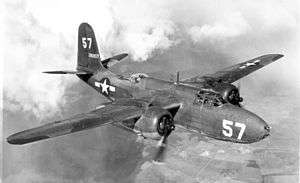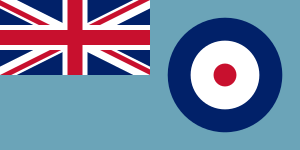No. 1454 Flight RAF
No. 1454 (Fighter) Flight was formed at RAF Colerne, Wiltshire on 27 June 1941, equipped with Turbinlite Douglas Boston and Douglas Havoc aircraft.[2] By 26 January 1942 the flight moved to RAF Charmy Down, Somerset.[3] On operations they co-operated with the Hawker Hurricanes of 87 Squadron,[4] which also flew from Charmy Down. The flight was replaced with 533 Squadron[3] on 8 September 1942 (not on 2 September due to administrative reasons)[5] but officially disbanded as late as 31 January 1943.[3]
| No. 1454 Flight RAF | |
|---|---|
 An A-20 Havoc of the USAAF, like the ones used by the flight | |
| Active | 27 Jun 1941 – 8 Sep 1942 |
| Country | |
| Branch | |
| Role | Night Fighter (Turbinlite) |
| Part of | No. 10 Group RAF, Fighter Command[1] |
| Insignia | |
| Squadron Badge heraldry | No known badge |
| Squadron Codes | No known identification code for the flight is known to have been carried |
533 Sqn, which had taken over men and machines, carried on flying the Turbinlite Bostons and Havocs till the system was abandoned on 25 January 1943,[6] when Turbinlite squadrons were, due to lack of success on their part and the rapid development of AI radar, thought to be superfluous.[7]
Aircraft operated
| From | To | Aircraft | Version |
|---|---|---|---|
| 27 June 1941 | 8 September 1942 | Douglas Havoc | Mk.I (Turbinlite) |
| 27 June 1941 | 8 September 1942 | Douglas Havoc | Mk.I |
| 27 June 1941 | 8 September 1942 | Douglas Havoc | Mk.II (Turbinlite) |
| 27 June 1941 | 8 September 1942 | Douglas Boston | Mk.II (Turbinlite) |
| 27 June 1941 | 8 September 1942 | Douglas Boston | Mk.III (Turbinlite) |
Flight bases
| From | To | Base |
|---|---|---|
| 27 June 1941 | 26 January 1942 | RAF Colerne, Wiltshire |
| 26 January 1942 | 8 September 1942 | RAF Charmy Down, Somerset |
Commanding officers
| From | To | Name |
|---|---|---|
| 27 June 1941 | September 1941 | S/Ldr. C.L. Gomm, DFC |
| September 1941 | October 1941 | S/Ldr. B.H.M. Winslett |
| October 1941 | March 1942 | S/Ldr. W.G. Moseby |
| March 1942 | 8 September 1942 | S/Ldr. D.P. McKeown, AFC |
References
- Notes
- Delve 1994, p. 57.
- Lake 1999, p. 90.
- Sturtivant and Hamlin 2007, p. 123.
- Rawlings 1978, p. 465.
- Jefford 2001, p. 97.
- Halley 1988, p. 403.
- Rawlings 1978, p. 463.
- Bibliography
- Delve, Ken. The Source Book of the RAF. Shrewsbury, Shropshire, UK: Airlife Publishing, 1994. ISBN 1-85310-451-5.
- Halley, James J. The Squadrons of the Royal Air Force & Commonwealth 1918-1988. Tonbridge, Kent, UK: Air Britain (Historians) Ltd., 1988. ISBN 0-85130-164-9.
- Jefford, C.G. RAF Squadrons, a Comprehensive record of the Movement and Equipment of all RAF Squadrons and their Antecedents since 1912. Shrewsbury, Shropshire, UK: Airlife Publishing, 1988 (second edition 2001). ISBN 1-85310-053-6.
- Lake, Alan. Flying Units of the RAF. Shrewsbury, Shropshire, UK: Airlife Publishing, 1999. ISBN 1-84037-086-6.
- Rawlings, John D.R. Fighter Squadrons of the RAF and their Aircraft. London: Macdonald & Jane's (Publishers) Ltd., 1969 (2nd edition 1976, reprinted 1978). ISBN 0-354-01028-X.
- Sturtivant, Ray, ISO and John Hamlin. RAF Flying Training And Support Units since 1912. Tonbridge, Kent, UK: Air-Britain (Historians) Ltd., 2007. ISBN 0-85130-365-X.
